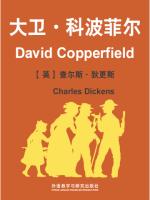Reading Report
jammy
Reading Report of David Copperfield Author’ Life Experience and Main
Works Charles John Huffam Dickens, born in 1812 and pass away in 1870,
is one of the most distinguished british writer and novelist in the 19th
century. People could still find his influence on contemporary
literature since he is also the most important writer after William
Shakespeare and a master of critical realism. His works reveal the cruel
and miserable side of capitalism society and build a whole perspective
of “the best of the time and the worst of the time” in Victoria time
within which are some excellent works like A Tale of Two Cities, The
Great Expectations and The Pickwick Papers. Domestic reviewers usually
regard him as a radical critic of the real ugly truth of capitalism
society, which I think is a appraisal on the basis of class conception.
From my point of view, he is more like a serious observer and thinker of
his time. On February 7th,1812, Dickens was born in a poor clerk family
in Portsmouth, southern England. His father was sent in prison for
failure to pay off his debt. Dickens had to take on the burden of whole
family even in his ten by working in a shoes-making factory.
Fortunately, his father unexpectedly received heritages from a relative
and this saved little Dickens. He was able to accept education.
Afterward, he tried many jobs from postman to copyist of lawyer. In
1832, he gained access to political classes being a reporter during
which he could see the darkness and complexity of politics circles as a
sensitive young man. This unique experience greatly enriched his
knowledge and broadened his horizon. It also shaped his literature style
to focus on the wide range of the entire society. Actually, many of his
novels are based on his earlier personal experience. This is especially
obvious in“his favorite child in his heart”---David Copperfield. Book
Review David’ father died when he was born, he was raised up by his
mother and a servant. His mother then married another man, Edward, who
treated him maliciously. So David was then sent to his uncle, a kind
fisherman, living with two orphans Ham and Emily. After a few years, his
mother passed away and David went to work in a factory, which was a hard
time for him. Fortunately, he found his aunt Betsay and he could go to
school. Then he lived in home of Betsay’ lawyer Wickfield and he fell in
love with lawyer’s daughter Dora. Having experienced a lot of uneasy
things, he finally became a writer only to find his wife die of
sickness. Finally he married his friend in childhood Emily and lived a
happy life. Thought after Reading As we know, an excellent work always
demonstrates the complexity of the real world just like The Dream of Red
Mansions. It’s the same with Dickens. You could find many vivid images
in the book whether encouraged or evil. For me, the most impressive
theme left in my mind is money worship. Author’s critical attitude on
money orientation value could be seen through the plot. David’s step
father married his mother for a great amount of legacy she received.
Emily ran away from her engaged husband because of her irresistance of
another wealthy young man. The miserable life of the Wickfields and Ham
are no wonder the result of money. Ordinary clerk Uriah Heep was pushed
into deep valley lured by money. However I refuse to view this as a kind
of hate or pure critic on capitalism and money. In this
autobiography-like novel, It’s the description of the bright side and
choice of being kind after experiencing a lot of unfair that matters. He
called for reconstruction of Puritan value. His main characters are no
doubt self-disciplined and full of justice, which is just what they lost
in that booming time. Writing Characteristics Dickens is good at
telling attractive stories. Unlike contemporary literature, authors were
keen on depict social environment and revealed tiny details of daily
life. In Dickens’s novel,especially A Tale of Two Cities, he always
built delicate structure containing amazing coincident. All kinds of
people come out through main characters’ ups and downs and they
cooperatively show the magnificent complete picture of the charming
Victoria time. He likes a kind old man sitting beside the fireplace
surrounded by curious kids and tell story slowly as well as vividly.
Something famous about this “favorite child” is what known as David
Copperfield rubbish, which mocks him up on his tedious words. I think
it’s just a funny character of his writing and nothing matters. If you
feel a little ridiculous, that may just improve your reading interest.
Compared with popular stream of consciousness, which words do you think
is more easy to comprehend?



 京公网安备 11010802032529号
京公网安备 11010802032529号